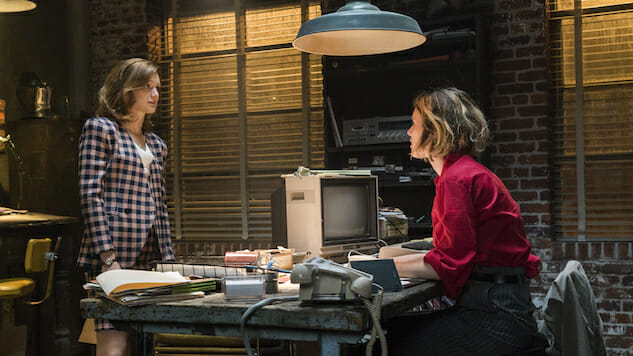Joe & Gordon & Donna & Cameron: Halt and Catch Fire and the Romance of Work
Photo: Tina Rowden/AMC
I am the product. —Joe MacMillan, Halt and Catch Fire
You are the product. You, feeling something. —Don Draper, Mad Men
The first season of Halt and Catch Fire sets up a romance—the one that involves Gordon (Scoot McNairy) and Joe (Lee Pace). Opposites attract, I suppose: In 1983, the latter, a smooth operator with plans to undercut IBM, entices the former, a frustrated engineer with a wife and two children, to create a PC to compete with the tech giant, and over the course of the next decade-plus, the two succeed, spar, fall out, fail and finally repair the damage, bearing key witness to the dawn of the Web. Though their relationship’s platonic, it resembles a marriage, growing and changing, becoming deeper, and more complex, with time; if it originates with an illicit arrangement—the pilot episode, “I/O,” features their first night together, reconstructing hardware in Gordon’s garage—the partnership emerges as a meeting of soul mates, stronger together than they are apart. When Gordon dies, near the end of the series’ fourth and final season, it’s Joe, and not his (now ex-) wife, who takes it the hardest. “I’m not… ready to do that,” he says to his friend and former colleague, Bos (Toby Huss), of fond reminiscences. I wonder if he’ll ever be ready: Some wounds never quite heal.
The second season of Halt and Catch Fire sets up another—the one that involves Donna (Kerry Bishé) and Cameron (Mackenzie Davis). Opposites attract here, too: In 1985, the latter, a brash coding wunderkind, relies on the former, an ambitious hardware whiz, to shepherd their company, Mutiny, through a series of logistical challenges, and over the course of the next decade-plus, the two succeed, spar, fall out, fail and finally repair the damage, bearing key witness to each other through the lens of Cam’s latest game. Though their relationship’s platonic, it resembles a marriage, growing and changing, becoming deeper, and more complex, with time; if it originates with Gordon and Joe’s own connection—Donna’s married to Gordon, Cam’s dating Joe—the partnership emerges as a meeting of soul mates, stronger together than they are apart. When Donna betrays Cam, near the end of the series’ superb third season, it recalls the hurt feelings of an acrimonious divorce. “How many times do you need to hear that I can’t do this without you?” Cam asks her under the stars one night. I once wondered if they’d ever know the answer, though their shared grief in “Goodwill” suggests they might: Some wounds do eventually heal, even if they leave us with scars.
-

-

-

-

-

-

-

-

-

-

-

-

-

-

-

-

-

-

-

-

-

-

-

-

-

-

-

-

-

-

-

-

-

-

-

-

-

-

-

-








































